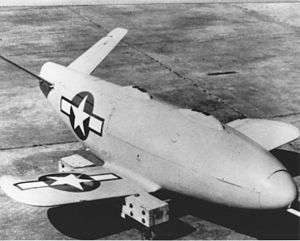LBD Gargoyle
| LBD-1 Gargoyle | |
|---|---|
|
An LBD-1 Gargoyle at NAS Mojave, in 1946. | |
| Type | anti-ship missile / guided bomb |
| Place of origin | United States |
| Service history | |
| In service | never used operationally |
| Wars | World War II |
| Production history | |
| Manufacturer | McDonnell Aircraft |
| Produced | 1945 |
| Specifications | |
| Weight | 688.1 kilograms (1,517 lb) |
| Length | 3.1 metres (10 ft 2 in) |
| Diameter | 508.0 millimetres (20 in) |
| Warhead | amatol |
| Warhead weight | 453.6 kilograms (1,000 lb) |
|
| |
| Engine |
8AS1000 JATO bottle 4,448.2 newtons (1,000 lbf) static thrust |
| Wingspan | 2.6 metres (8.5 ft) |
Operational range | 9.3–13.0 kilometres (5–7 nmi) |
| Speed | 970 kilometres per hour (600 mph) |
Guidance system | radio command |
Launch platform | aircraft |
The McDonnell LBD-1 Gargoyle (later KBD-1) was an American air-to-surface missile developed during World War II . It was one of the precursors of modern anti-ship missiles.
History
Following German success with the Hs-293 and Fritz-X, the U.S. began work on a series of similar weapons, based on its own success with the Azon guided ordnance. These included Bat, Felix, GB-8, and Gargoyle.
Gargoyle had a 450 kilograms (1,000 lb) warhead (M65 general-purpose or M59 semi–armor-piercing), intended to be launched from carrier-borne aircraft in conditions of good visibility, against maneuvering targets. Launched from 4,600 m (15,000 ft), it had a range of almost 9.3–13.0 kilometres (5–7 nmi), and could be controlled at up to 52 kilometres (28 nmi).
A launch speed of at least 320 kilometres per hour (200 mph) was necessary, so its low wings would not stall; a 4,400 newtons (1,000 lbf) static thrust 8AS1000 jet-assisted takeoff (JATO) bottle in the tail boosted it to a maximum speed of 970 km/h (600 mph).
Operated by radio command guidance, Gargoyle was tracked visually by means of flares in the tail, much as Fritz-X was; this limited its maximum range to how far the flares could be seen. Gargoyle was capable of sustaining a 4 g0 (39 m/s2) turn, for a turning circle of 777.2 metres (2,550 ft).
Production by McDonnell Aircraft began in 1944 and the missile was tested from March to July 1945, but the war ended before it entered operational service. Testing continued, however, until it was cancelled in 1947.
See also
- Related lists
Sources
- This article contains material that originally came from the placard at the Steven F. Udvar-Hazy Center.
- Fitzsimons, Bernard, editor. "Gargoyle", in The Illustrated Encyclopedia of Weapons and Warfare, Volume 10, p. 1090. London: Phoebus Publishing, 1978.
External links
| Wikimedia Commons has media related to LBD Gargoyle. |
- Gargoyle Missile at the National Air and Space Museum
- Allied & German guided weapons of WW2
- The Dawn of the Smart Bomb
- Guided weapons of WW2
- GB series weapons
